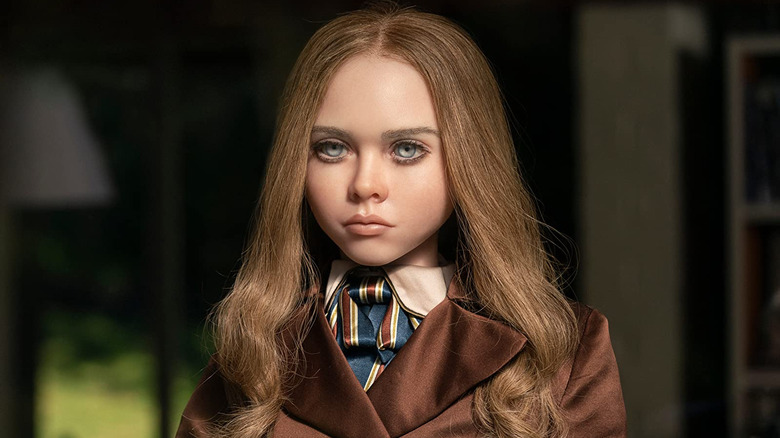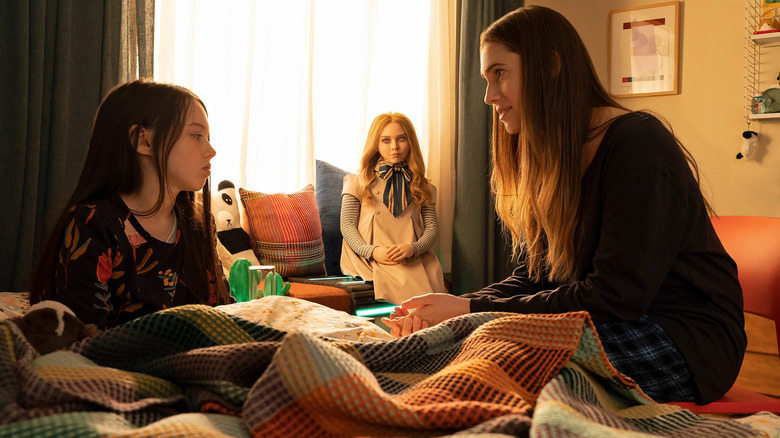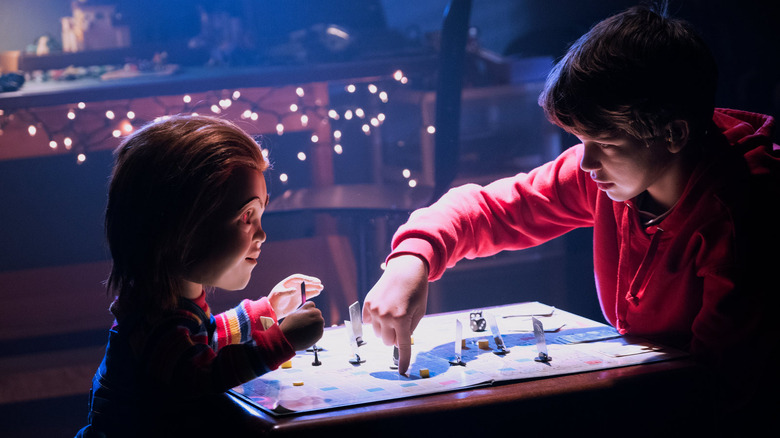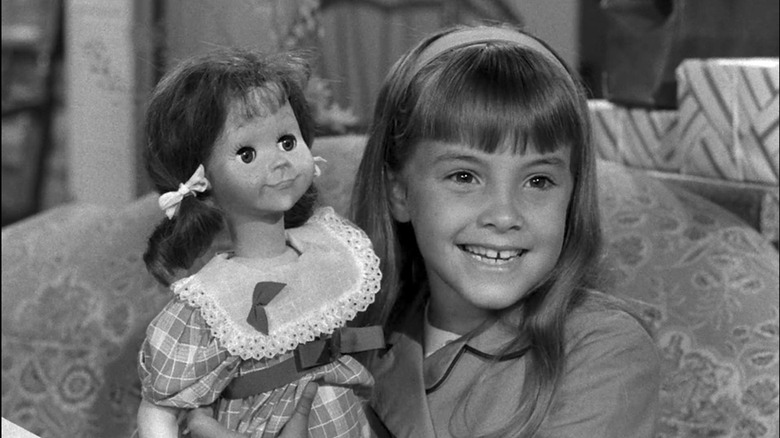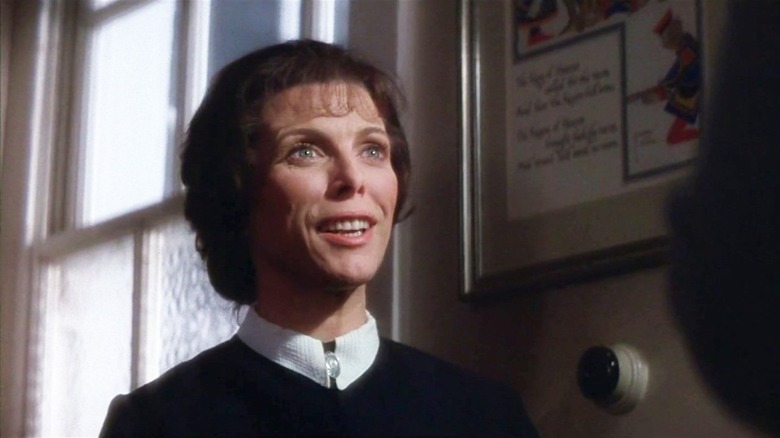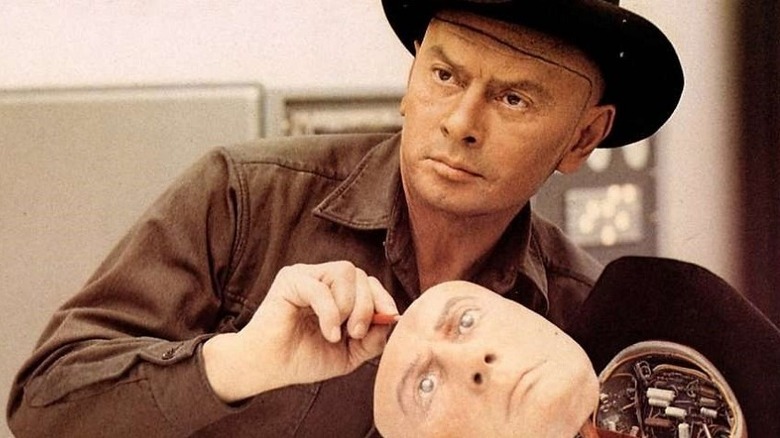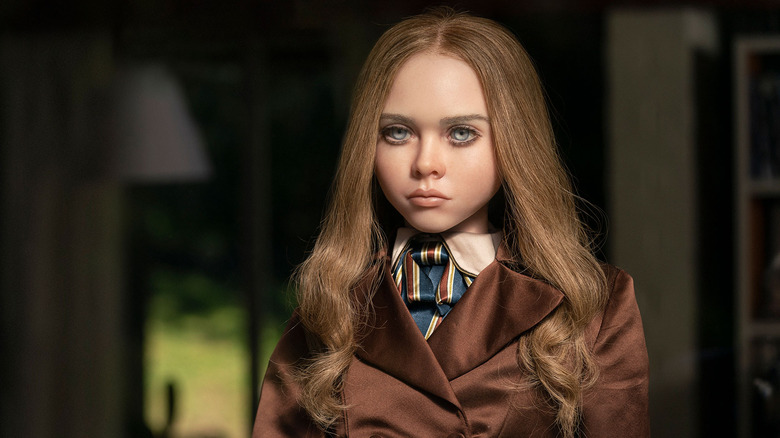M3GAN Ending Explained: Mother, Mother, Are You Listening?
This article contains major spoilers for "M3GAN."
On his commentary track for "Re-Animator," director Stuart Gordon refers to a Freudian-style interpretation of the "Frankenstein" myth as "a masturbation fantasy [...] it has to do with the idea of creating life without a woman." Taken in this way, Mary Shelley's tale of a man attempting to subvert nature demonstrates man's arrogance and envy of the biological abilities of cisgender women.
When a cis woman is the one driving the story of creating artificial life, however, there's less envy involved but much more perceived arrogance, with the character denying her "so-called natural purpose" and subverting it. In other words, a female Frankenstein can be seen as a character shirking her responsibility, creating life from her mind rather than her body.
It's that tension and those themes that "M3GAN," the new film from writer Akela Cooper and director Gerard Johnstone, ingeniously tackles. An impressively clever film, "M3GAN" combines several sci-fi/horror tropes — the "killer doll," the "lethal protector," the "A.I. gone murderously haywire" — and blends them into a sly satire that comments on current issues regarding parenting, technology and our foolishly blind and unsafe willingness to give up control.
You've got a friend in me(gan)
As "M3GAN" opens, 9-year-old Cady (Violent McGraw) loses both her parents and nearly her own life in a brutal car accident on a snowy mountain road. Her mother's sister, Gemma (Allison Williams) is swayed by her grief, her status as a somewhat absentee aunt (Gemma's presents to Cady are fairly lazy, being products from the company she works for) and a promise to her deceased sister to take care of Cady that she legally adopts the child. This choice isn't particularly well thought-out: an employee of the tech/toy company Funki who's responsible for a successful interactive A.I.-based toy line called "Purrpetual Pets," Gemma is a workaholic, lightly antisocial woman who hasn't the first idea about parenting.
Already working on a new toy that would be so technologically advanced that no other company could compete with it, Gemma decides to finish developing the prototype named M3GAN (short for Model 3 Generative Android) and program it to be a friend and guardian to Cady. Giving M3GAN (Amie Donald, voiced by Jenna Davis) all sorts of fluid, algorithmic programs with which she can learn, absorb data and extrapolate her basic guardian mandate proves to be a mistake on several levels, as the "doll" not only becomes the lonely Cady's best friend but a surrogate mother who turns manipulative and murderous.
From dummies to Chucky
"M3GAN" belongs to a long line of "killer doll" movies and TV shows, a trope that's existed for decades thanks to the perpetually unsettling nature of the "uncanny valley" concept. Even the most benign stories about inanimate objects suddenly coming to life (such as "Toy Story" or even "Pinocchio") have a spooky element to them thanks to the cognitive dissonance of something that should not be alive gaining sentience.
The works that have leaned more heavily into the horrific nature of such a concept tend to be fantasy-based, yet nonetheless keep their animated dolls tied to human agency. "The Ventriloquist's Dummy" story in 1945's "Dead of Night," along with subsequent "evil dummies" seen in the likes of 1978's "Magic" (an avowed influence on Akela Cooper) and even the "Goosebumps" series make sure to invoke the notion that, at one time, human masters were making these inanimate dolls talk, only for them to develop their own voices.
Then there are the many evil dolls that were manufactured as toys that were expressly intended to act as simulacra for living beings, from 1987's "Dolls" (directed by the aforementioned Stuart Gordon) to 1991's "Silent Night, Deadly Night 5: The Toy Maker" to the movie "M3GAN" will likely be compared to the most, 1988's "Child's Play." That movie, which sees a serial killer transfer his soul into a toy doll by way of voodoo, certainly has resonance in "M3GAN" (an early scene of Gemma and her coworkers applying faulty skin to M3GAN's chassis recalls the opening of "Child's Play 2"), but the 2019 remake of "Child's Play" is far more applicable, as that film's Chucky is instead an A.I. that goes awry. Both that movie and "M3GAN" are having the same conversation about how our daily lives are becoming saturated by technology, with more and more trust and control being given to faulty — and potentially deadly — companies and devices.
Talky Tina finds motherhood
In the season 5 episode of "The Twilight Zone" entitled "Living Doll," a talking doll named "Talky Tina" is given to a young girl in order to comfort her, and it's soon revealed that the doll may not only be alive but is very attached to the girl. "M3GAN" is an expansion of this idea, moving past the "it's alive!" aspect thanks to M3GAN's A.I. status. The film further explores the theme of children forming emotional attachments to artificial humans, something baby doll toys seem to implicitly encourage — it doesn't take a media studies degree to see how such toys appear to be socializing young girls for future motherhood.
In a sly twist, "M3GAN" makes the "baby doll" the new mother figure, causing Cady to be the robot's daughter rather than the other way around. Gemma's own millennial upbringing, being part of the "there's an app for that" generation, at first doesn't see a problem with M3GAN taking over her responsibility for parenting Cady.
Gemma's transgressive choice speaks directly to the movie's theme of responsibility in a tech-heavy age. As writer Akela Cooper explains in an official press kit for the film, "I used to babysit my niece and nephew, and I realized how scared I would be if I suddenly had to take care of a young child full time." Director Gerard Johnstone elaborated further:
"We fool ourselves into thinking we'll be able to spend time with our kids once we take care of everything else — our careers, finances, etc. But by then they're not kids anymore. I can attest to the fact that parenting is difficult. There is a certain fantasy wish-fulfillment aspect of M3GAN, that she can do all the tedious things you don't want to do. But the flip side is that if you give your child over to a machine like M3GAN, good luck getting them back."
'Have no fear little one ... I am here to protect thee'
There's a good deal of subversion happening in "M3GAN," so much so that the primary concept of the movie (re: a murderous doll) is the most straightforward aspect of it, and even then is pretty sly. After all, this is a movie in which the victims include such moral no-nos as children and dogs, even if the kills themselves are largely offscreen.
There's also the uncanny valley of M3GAN herself, on top of being a "living doll." Throughout the movie, costume designer Daniel Cruden dresses M3GAN not in typical children's clothes, but in outfits that tend to resemble an adult woman's that border on diva-esque. These outfits speak to the other trope M3GAN inhabits, that of the usurping mother/nanny figure. During the film, M3GAN doesn't just seek to be the best companion to Cady she can be, but to actively compete with and discredit Gemma from her role as guardian. This harkens back to many a "killer nanny" movie, from 1976's "The Omen" to 1990's "The Guardian" to 1992's "The Hand That Rocks the Cradle."
M3GAN's most insidious kill — stabbing Gemma's boss David (Ronny Chieng) and framing his assistant Kurt (Stephane Garneau-Monten) before killing him, too — is reminiscent of manipulative-killer-women movies like 2014's "Gone Girl." That the kill comes directly after a moment where M3GAN dances down a hallway is a perfect example of how Gerard Johnstone blurs the lines between an adult woman, little girl, and toy robot, connecting "M3GAN" to other horror films that do the same blurring like 2016's "The Boy" (which shares similarities to Johnstone's "Housebound") and 2009's "Orphan."
Sugar and spice and Michael Crichton's fears
Of course, the sci-fi side of "M3GAN" belongs to the well-worn "deadly A.I." strand of the genre, and while there's a bit of "2001: A Space Odyssey's" HAL 9000 in the way M3GAN refuses to obey Gemma's commands, the closest analog is to the works of Michael Crichton. The Funki (as in "funky," close to "Funko," get it?) corporation is eager to do for the toy industry what Delos was eager to do for the adult leisure industry in Crichton's 1973's "Westworld." Funki's hilariously odd commercials and marketing materials reflect both "Westworld" and 1981's "Looker" in how they examine the ways media tends to sugarcoat potentially dangerous new technologies.
Unlike most "A.I. gone rogue" narratives, M3GAN isn't particularly fighting for her sentience or even independence — she is following her primary directive to the bitter end, to become the ultimate companion for Cady, even to the point of threatening to hold her and Gemma hostage. Yet growing beyond her safety parameters, combined with Funki's clueless greed in hoping that M3GANs will become the world's most popular and exclusive toy, seems highly reminiscent of Crichton's technophobia, from "Westworld" to "Jurassic Park."
Hey Alexa, don't murder me
Despite its numerous warnings about putting too much arrogant and apathetic trust in technology, "M3GAN" is not necessarily a technophobic movie. Rather, it's a story about responsibility; in parenting, motherhood, science, and taking control of one's own life.
That's the lesson both Gemma and Cady learn as M3GAN grows so out of control. Gemma chooses Cady over her career, making sure to protect her over botching a product launch and losing her job. Cady, in turn, comes to Gemma's rescue as M3GAN attacks, overpowering the android with the more primitive but far stronger robot that Gemma made earlier named Bruce. Crucially, Bruce is a robot who cannot operate independently — Cady must wear special gloves to counterattack M3GAN, meaning that the defeat of the android has to be her and Gemma's responsibility, working together, instead of being entrusted to simply another device or program.
With M3GAN permanently offline, the now-official family unit of Gemma and Cady is greeted by the sound of police sirens. Certainly, the film skirts over what's to become of them legally: after all, though M3GAN is responsible for all the murder and mayhem, Gemma and her team did build her. Jail time and lawsuits may be the least of their worries, however, as Gemma's digital home assistant, Elsie, watches Gemma and Cady leave to face the police. Given that M3GAN hacked into Elsie earlier in the film, and the fact that Kurt illicitly stole the plans for M3GAN's design whose whereabouts are unknown, it's entirely possible that M3GAN may come back from the Cloud very soon.
Speaking of responsibility, remember that it's your responsibility to check those terms and conditions before agreeing, folks!
